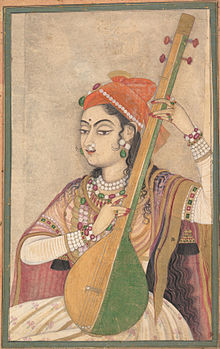Vande Maataram
|
English: Vande Mātaram, वन्दे मातरम्,বন্দে মাতরম্ |
|
|---|---|
| Vande Mataram (Sanskrit, Hindi and official pronunciation) Bande Matarom (Bengali pronunciation) |
|
| Lyrics | Bankim Chandra Chattopadhyay, Anandamath (1882) |
| Music | Jadunath Bhattacharya |
| Adopted | 24 January 1950 |
| Music of India | |
|---|---|

A Lady Playing the Tanpura, ca. 1735 (Rajasthan)
|
|
| Genres | |
|
|
| Media and performance | |
| Music awards | |
| Music festivals | |
| Music media | |
| Nationalistic and patriotic songs | |
| National anthem | Jana Gana Mana |
| Regional music | |
|
|
Vande Mataram (IAST: Vande Mātaram, Devanagari: वन्दे मातरम्,Bengali: বন্দে মাতরম্) is a poem composed by Bankim Chandra Chattopadhyay in 1870s, which he included in his 1881 novel Anandamath. The first two verses of the song were adopted as the National Song of India in October 1937 by Congress Working Committee prior to the end of colonial rule in August 1947.
An Ode to Durga as the Mother goddess, it was written both in Sanskrit and in Bengali script in the novel Anandmath. The title 'Vande Mataram' literally means "I praise thee, Mother" or "I praise to thee, Mother". The "mother goddess" in later verses of the song has been interpreted as the motherland of the people - Bangamata (Mother Bengal) and Bharat Mata (Mother India), though the text does not mention this explicitly.
It played a vital role in the Indian independence movement, first sung in a political context by Rabindranath Tagore at the 1896 session of the Indian National Congress. It became a popular marching song for political activism and Indian freedom movement in 1905. Spiritual Indian nationalist and philosopher Sri Aurobindo referred it as "National Anthem of Bengal". The song and the novel containing it was banned by the British government, but workers and general public defied the ban, many went to colonial prisons repeatedly for singing it, and the ban was overturned by the Indians after they gained independence from the colonial rule.
In 1950 (after India's independence), the song's first two verses of the song were declared the "national song" of the Republic of India, distinct from the national anthem of India, Jana Gana Mana. The first two verses of the song are an abstract reference to mother and motherland, they do not mention any Hindu deity by name, unlike later verses that do explicitly mention goddesses such as Durga. There is no time limit or circumstantial specification for the rendition of this song [unlike the national anthem Jana Gana Mana that specifies 52 seconds].
...
Wikipedia
